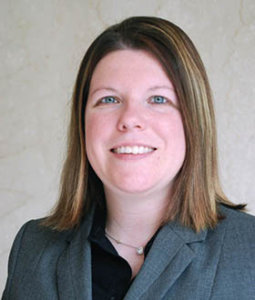 Both Clarks Summit University president, Dr. Jim Lytle, and vice president of academics, Dr. Bill Higley, have their sights set on significant growth in CSU’s online programs. “We believe there’s a much greater pool of students who would benefit from our online programs,” says Lytle. To focus on that growth and give dedicated attention to online student offerings, CSU has hired Erica Young as executive director of online education.
Both Clarks Summit University president, Dr. Jim Lytle, and vice president of academics, Dr. Bill Higley, have their sights set on significant growth in CSU’s online programs. “We believe there’s a much greater pool of students who would benefit from our online programs,” says Lytle. To focus on that growth and give dedicated attention to online student offerings, CSU has hired Erica Young as executive director of online education.
Dr. Jim Lytle, CSU president, describes Young as a “creative and very personable natural leader.” He continues, “She is deeply invested in online education, proven through her own training and through working with hundreds of students. Having her in this cabinet-level position will ensure that we produce excellent online education—the best possible classes taught by the best possible teachers in the best possible way for each student.”
Dr. Bill Higley agrees, calling Young’s hire, “a key component of growing our online program.” He believes CSU’s online programs offer flexibility for the busy adult learner. “All our courses feature active group discussion every week,” he continues, citing this intentional building of personal interaction between peers and instructors as one element that sets CSU online programs apart from independent-study-style courses offered elsewhere.
“Someone with Erica’s skills, experience and degrees will be able to move us into building a commitment to more and more online students as we prepare them to become Christ-centered, career-ready graduates,” asserts Lytle.
From Purdue to CSU
Young was most recently lead instructional designer for digital initiatives at Purdue University and adjunct instructor for Purdue’s Brian Lamb School of Communication. With a decade of experience in online education, she has trained instructors in online education, led the hybridization of Purdue’s Weekend MBA Program, was named “MVP for Instructional Design and Support” at Purdue, presented her work at several online learning conferences and helped develop a method of assessing online course quality. She was part of Purdue’s IMPACT faculty development program, which was featured as one of the top six programs inspiring innovation in teaching by the Chronicle of Higher Education. She also became certified to evaluate courses using the industry-standard Quality Matters Rubric and piloted new educational technology which was integrated into Purdue’s learning management system. As a thought leader in online education, Young’s work has been published with “the evoLLLution,” an online higher education newspaper. With an undergraduate degree from Penn State University, Young earned her Master of Science in Education in Learning Design and Technology from Purdue University.
Returning Home to CSU
While she amassed experience and education at Purdue, her roots run deep in Northeast Pennsylvania. In 2009, she began a part-time position at CSU as learning management system assistant. She advanced to distance education facilitator and then director of educational technology through 2014. A native of Scott Township, just a short drive from the Clarks Summit campus, Young says her return brings her “back to the area where I left a big piece of my heart.”
She is excited about her new role, since it aligns with her personal values. “I’m on board with the school’s mission, and I value the close-knit community that CSU affords…The campus feels like a family, and I’m looking forward to the collaborative nature of the people there…As Simon Sinek said, ‘If you hire people just because they can do a job, they’ll work for your money. But if you hire people who believe what you believe, they’ll work for you with blood, sweat and tears.’” As she gained new perspectives and best practices for online higher education and leadership at Purdue, she admits, “I would find myself applying the topics of discussion to a private school like CSU instead of only thinking about how they applied to large public institutions…I have always remained interested in how to move the school forward.”
Goals for Online Growth
“Most of all, I’m excited for the potential impact I could have in terms of expanding online offerings and providing more people with the opportunity to study at CSU,” Young states. “Data tells us that online students typically choose schools that are within a 90-mile radius of where they reside. While there are a few institutions that offer online programs in and near the NEPA area, the market is far from saturated. I think CSU might have a unique opportunity to enter into that space while it’s still in demand. And that’s exciting!”
Young was drawn to online education simply because of its reach. “The flexibility of it allows people to receive an education who might not otherwise be able to pursue one,” she notes. One of her plans for the online area will ultimately include flexible and expanded offerings. “Enrollment growth is a goal, but hopefully that’s something that naturally happens as a result of the main driver of expanding access to those needing flexible options.”
Capturing CSU’s Strengths in Online Offerings
“I would also like to work on ways that the CSU culture can show itself in the online environment, capitalizing on CSU’s strengths,” Young says. “This involves ensuring that student mentoring, something CSU does well, is embedded into the online education program.” She strongly believes, “It’s not just about the quantity of offerings but the quality. I think it will be important to ensure that the courses are engaging and are a place where students can think critically and apply what they are learning to their work and/or church context. There should be a robust transfer of ideas from the online classroom to work/church and from work/church to the online classroom.”
Young appreciates how both CSU’s online and on-campus programs share a unique outcome. “It provides students with a framework for how to think. It helps people to develop not just what they know but who they are. In other words, it helps students not only build knowledge but character as well.”
Young is projected to assume her new role in June.
by Erika A. Bruckner (’04)
Published May 6, 2019 in News

Recent Comments